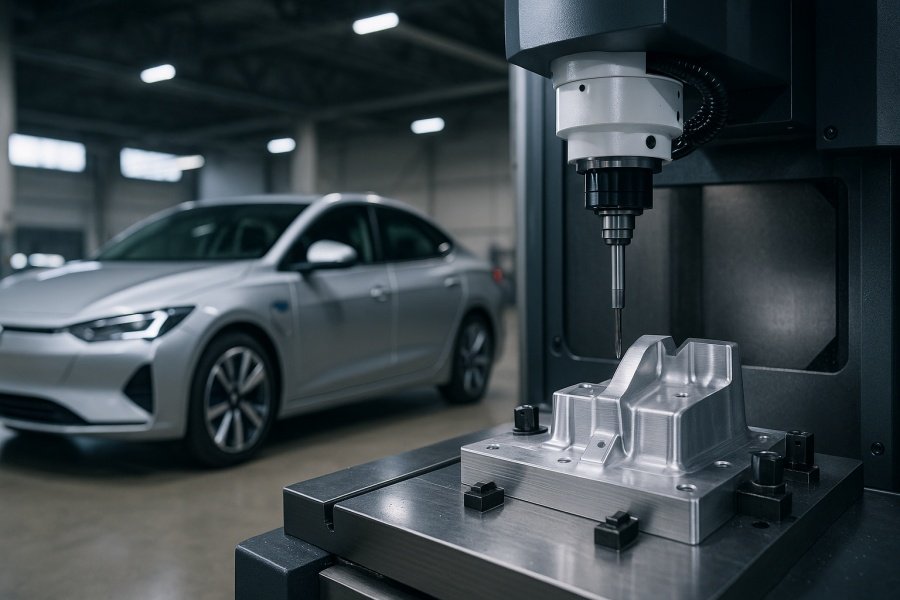Precision: The Non-Negotiable Currency in rapic prototyping in automotive industry
Every advancement in automotive engineering – from extended EV range to crash safety – hinges on a hidden foundation: precision prototype tooling. When validating a new battery enclosure or active aero component, deviations as small as 0.05mm can cascade into thermal runaway risks or aerodynamic instability. This is where CNC-driven prototype tooling transitions from supporting role to critical enabler. Unlike production tooling, prototyping tooling must achieve production-intent accuracy while accommodating rapid design iterations – often within 5% of final material thickness and surface finish specifications.
Material Matters: Precision Tooling for Next-Gen Automotive Materials
Rapid prototyping in automotive industry components now involves advanced materials that demand unprecedented tooling precision:
- Carbon Fiber Battery Housings:
CNC-machined mold tools require <0.1mm flatness to prevent resin pooling or dry spots during pre-preg layup. A 0.3mm deviation in a prototype mould core can cause 12% variance in crash test results. - Casting-Ready Sand Cores:
5-axis CNC machining of bonded sand cores for aluminum castings (e.g., brake calipers) demands ±0.075mm accuracy to ensure cooling channel integrity under 3000psi fluid pressure. - Multi-Material Hybrids:
Overmolding tools for vibration-damping engine mounts combine metal inserts with elastomers. Tooling precision ensures adhesive-free bonding interfaces ≤0.01mm gap tolerance.

Thermal Dynamics: Where Prototype Tooling Meets Extreme Conditions
Rapid prototyping in automotive industry thermal systems exposes precision gaps invisible at room temperature:
- Combustion Chamber Simulations:
Rapid prototype jig for cylinder head sand cores must account for 400°C thermal expansion during casting. Compensatory CNC tool paths are programmed using FEA distortion data. - EV Cooling Plate Tooling:
Micro-channel mold tools machined with ≤20μm wall consistency prevent glycol leaks during 150°C/1000hr durability tests. - Brake Duct Validation:
Wind tunnel test ducts require Class A surface tooling (Ra≤0.4μm) to accurately measure airflow separation at 200km/h.
Precision Payoff: Thermal testing rework drops 70% when pilot tooling incorporates thermal compensation at the machining stage.
The Sensor Revolution: Prototype Tooling for ADAS & Autonomy
Autonomous vehicle sensors magnify precision requirements:
| Component | Precision Demand | Tooling Solution |
|---|---|---|
| LiDAR Housings | ±0.02° optical window angularity | Diamond-turned aluminum mold tools |
| Radar Mounts | 5μm resonant frequency stability | Stress-relieved tool steel cores |
| Camera Brackets | 0.05mm vibration dampening consistency | CNC-machined viscoelastic inserts |
Precision Economics: Accelerating Automotive Prototyping Cycles
Strategic prototype tooling precision delivers compounding ROI:
- Time Compression: High-accuracy tooling enables “test-like-you-fly” prototyping, slashing validation cycles from 18 to 6 weeks (e.g., Tesla gigacasting prototype tools)
- Cost Avoidance: Every 0.1mm improvement in battery module tooling precision prevents $220K in thermal runaway containment redesigns
- Sustainability: Precision-machined sand cores reduce aluminum casting scrap rates from 15% to 3% during rapid prototyping in automotive industry powertrains
Precision as the Silent Accelerator
In the race toward electrified and autonomous vehicles, prototype tooling precision has evolved from quality metric to strategic catalyst. The ability to machine tooling components within microns – whether for composite battery trays, cast structural parts, or sensor arrays – determines how quickly automotive innovations transition from CAD screens to crash-tested reality. As tolerances tighten and materials advance, CNC-driven precision becomes the invisible infrastructure enabling safer, cleaner, and smarter mobility.
CALL TO ACTION:
Have CAD files for automotive prototype tooling? Contact us and we’ll offer you Free Precision Feasibility Analysis – includes thermal/structural deviation simulation report.
